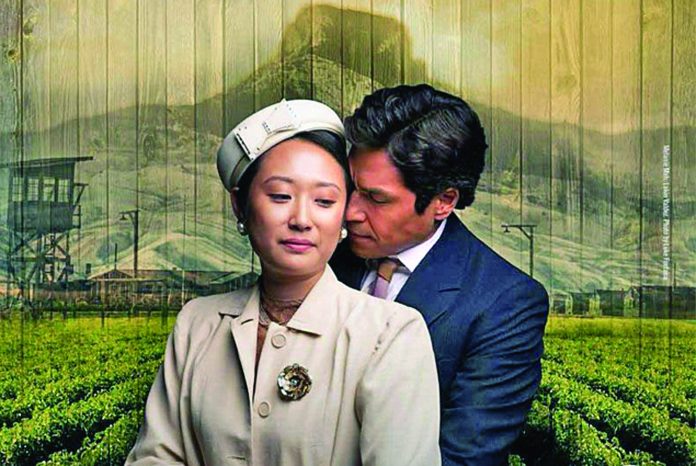For playwright, director and El Teatro Campesino founder Luis Valdez, who was born in Delano to migrant farm worker parents who made a living picking whatever crop was in season, Cupertino will always be known for the rich land that once grew an abundance of crops and fruits trees during the time he lived in the area shortly after World War II. His latest play, the phenomenal VALLEY OF THE HEART at the Mark Taper Forum uses California history as a jumping-off point to tell an important story about the fight to maintain dignity, identity, family and faith in what is now known as the Silicon Valley.
“Valley of the Heart,” tells the story of the Yamaguchis and the Montaños, two immigrant families struggling to provide a future for their American-born children after the Great Depression on the farmland. The two families come from different backgrounds: one as owners and the other as sharecroppers. Like a modern Romeo and Juliet, the divergent families’ oldest children secretly fall in love, only to have the emotional stakes further heightened when the attack on Pearl Harbor throws these Mexican and Japanese American families into uncertainty after the Yamaguchis are interned with thousands of other Japanese Americans. Allegiances are tested, heroes are made and the two young lovers must find a way to stay loyal both to their families, their country and each other.
Every single aspect of this production is top notch from Valdez’s brilliantly written script and impeccable quick-paced direction to the entire cast who perfectly portray each of the characters so thoroughly, beginning with Melanie Arii Mah and Lakin Valdez as the young lovers, Thelma Yamaguchi, and Benjamin Montaño. You will find yourself on their side from their childhood flirtations in the fields to their illicit love affair when she was engaged to scholarly Calvin Sakamoto (Scott Keiji Takeda), her unplanned bi-cultural pregnancy just prior to the Japanese attack on Pearl Harbor, to their quickie marriage and the ensuing hardship they endured when her family was sent to an internment camp in the Wyoming dust bowl while Ben stayed behind to care for the farm and watch it grow to 300 acres, supplying food to American troops.
While doing their best to hold the marriage together, the two also remain deeply devoted to their families, with both sets of parents as guiding lights in their lives. Randall Nakano and Joy Osmanski portray the Japan-born Ichiro and Hana Yamaguchi as hard-working immigrant farmers deeply tied to their homeland as well as their American soil, torn between allegiances which pull them apart into different locations when forced out of their beloved home. Daniel Valdez and Rose Portillo inhabit the Montaño parents’ hearts and souls, taking us along for their emotional journey from struggling sharecroppers barely making ends meet to the managers of a vast and productive farm, living the type of life they could only dream about before the war. It is the combination of great joy and much sorrow that unites both families, as well as the rest of us, in this universal tale of survival.
As the story unfolds via Thelma and Ben reading letters exchanged between them, projections designed by David Murakami vividly portray the elements faced by each of them as well as the world at large as the war takes its toll, including the deaths of sons from both families in the Pacific (Moises Castro as Ernesto “Tito” Montaño) and Europe (Justin Chien as Joe “Yoshi” Yamaguchi). Younger sister Maruca Montaño (Christy Sandoval) matures from a fun-loving teen into serving her country as a WACC studying to be a bilingual nurse. Dressed as Japanese Kurogo stagehands in Ninja-style full body-covering black attire, Mariela Arteaga and Michael Naydoe Pinedo move scenery and props and play several supporting roles, including the jeep bringing Ichiro to join his family in the Heart Mountain “Relocation Center.”
Scenic designer John Iacovelli’s magnificent representation of the two colliding cultures is represented by the Mexican family’s wooden shack on one side of the stage and the Japanese family’s brick house on the other, both of which float into place as we follow the unfolding tale of their intersecting lives. This is especially true when the same wooden shack becomes the internment camp home of the displaced Japanese family in the Wyoming dust bowl while the Mexican family lives better than ever in the brick house as they tend to the farm. Fate reverses their lives right down to the type of building in which they live but never changes the deep love shared within those walls. And that is what finally unites the families.
“Valley of the Heart” tickets are available online at CenterTheatreGroup.org or by calling (213) 628-2772 or in person at the Center Theatre Group Box Office (at the Ahmanson Theatre at The Music Center in Downtown Los Angeles). Tickets range from $30 to $99. Performances are scheduled daily except on Mondays at The Mark Taper Forum. The theater is located at 135 N. Grand Avenue in Downtown L.A.

